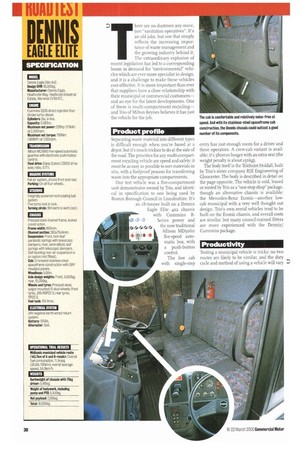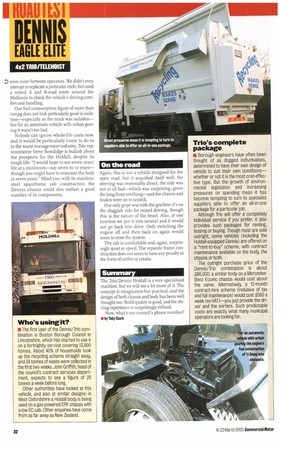here are no dustmen any more, just "sanitation operatives". It's
Page 32

Page 34

If you've noticed an error in this article please click here to report it so we can fix it.
an old joke, but one that simply reflects the increasing importance of waste management and the growing industry behind it. The extraordinary explosion of recent legislation has led to a corresponding boom in demand for "environmental" vehicles which are ever more specialist in design, and it is a challenge to make these vehicles cost-effective. It is more important than ever that suppliers have a close relationship with their municipal or commercial customers— and an eye for the latest developments. One of these is multi-compartment recycling— and Trio of Milton Keynes believes it has just the vehicle for the job.
Product profile
Separating waste material into different types is difficult enough when you're based at a depot, but it's much trickier to do at the side of the road. The priorities for any multi-compartment recycling vehicle are speed and safety: it must be as easy as possible to sort materials in situ, with a foolproof process for transferring waste into the appropriate compartments.
Our test vehicle was a five-compartment unit demonstrator owned by Trio, and identical in specification to one being used by Boston Borough Council in Lincolnshire. It's an 18-tonner built on a Dennis Eagle Elite 4x2 chassis with Cummins BSeries power and the now traditional Allison MD3o6o to Go 6, five-speed automatic box, with a push-button control.
The low cab with single-step
entry has just enough room for a driver and three operators. A crew-cab variant is available; it's 380mm longer with an extra seat (the weight penalty is about 150k0.
The body itself is the Telehoist Holdall, built by Trio's sister company RJE Engineering of Gloucester. The body is described in detail on the page opposite. The vehide is sold, leased or rented by Trio as a "one-stop shop" package, though an alternative chassis is available: the Mercedes-Benz Econic—another lowcab municipal with a very well thought out design. Trio's own rental vehicles tend to be built on the Econic chassis, and overall costs are similar, but many council-trained fitters are more experienced with the Dennis/ Cummins package.
Productivity
Testing a municipal vehicle is tricky: no two routes are likely to be similar, and the duty cycle and method of using a vehicle will vary
0 even more between operators. We didn't even attempt to replicate a particular cycle, but used a mixed A and B-road route around the Midlands to check the vehicle's driving comfort and handling.
Our fuel consumption figure of more than rimpg does not look particularly good in isolation—especially as the truck was unladen— but for an automatic vehicle with urban gearing it wasn't too bad.
Nobody can ignore whole-life costs now, and it would be particularly ironic to do so in the waste management industry. Trio representative Steve Bowdidge is bullish about the prospects for the Holdall, despite its tough life: "I would hope to see seven years' life at a minimum—say seven to co years— though you might have to remount the body at seven years." Mind you, with its stainlesssteel spaceframe cab construction the Dennis chassis could also outlast a good number of its components.
On the road
Again, this is not a vehicle designed for the open road, but it acquitted itself well: the steering was reasonably direct, the ride was not at all bad—which was surprising, given the long front overhang—and the chassis and brakes were up to scratch.
Our only gripe was with the gearbox: it's on the sluggish side for mixed driving, though this is the nature of the beast. Also, at one junction we put it into neutral and it would not go back into drive. Only switching the engine off and then back on again would seem to reset the system.
The cab is comfortable and, again, surprisingly quiet at speed. The separate frame construction does not seem to have any penalty in the form of rattles or creaks.
Summary
The Trio/Dennis Holdall is a very specialised machine, but we will see a lot more of it. The concept is imaginative but practical, and the design of both chassis and body has been well thought out. Build quality is good, and the driving experience is surprisingly refined.
Now, what's our council's phone number?
• by Toby Clark
















































































































